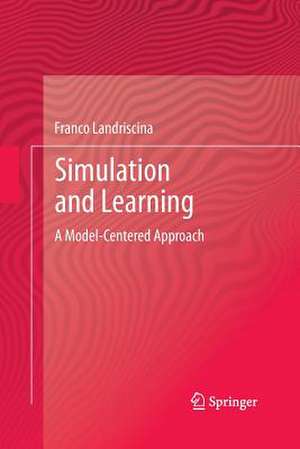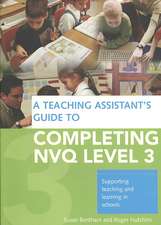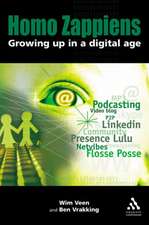Simulation and Learning: A Model-Centered Approach
Autor Franco Landriscinaen Limba Engleză Paperback – 8 apr 2015
| Toate formatele și edițiile | Preț | Express |
|---|---|---|
| Paperback (1) | 627.68 lei 6-8 săpt. | |
| Springer – 8 apr 2015 | 627.68 lei 6-8 săpt. | |
| Hardback (1) | 632.51 lei 6-8 săpt. | |
| Springer – 5 mar 2013 | 632.51 lei 6-8 săpt. |
Preț: 627.68 lei
Preț vechi: 738.44 lei
-15% Nou
Puncte Express: 942
Preț estimativ în valută:
120.16€ • 124.90$ • 99.63£
120.16€ • 124.90$ • 99.63£
Carte tipărită la comandă
Livrare economică 07-21 februarie 25
Preluare comenzi: 021 569.72.76
Specificații
ISBN-13: 9781489999658
ISBN-10: 1489999655
Pagini: 256
Ilustrații: XVII, 236 p.
Dimensiuni: 155 x 235 x 13 mm
Greutate: 0.36 kg
Ediția:2013
Editura: Springer
Colecția Springer
Locul publicării:New York, NY, United States
ISBN-10: 1489999655
Pagini: 256
Ilustrații: XVII, 236 p.
Dimensiuni: 155 x 235 x 13 mm
Greutate: 0.36 kg
Ediția:2013
Editura: Springer
Colecția Springer
Locul publicării:New York, NY, United States
Public țintă
ResearchCuprins
-The Simulation Paradox: If Simulations are Good for Learning, where are they?, The Epistemic Status of Simulation, Simulation Myths and Fads. -An Introduction to Simulation for Learning: What is Simulation for Learning, The Need for a Generalist Approach, Differences between Simulation and Games, Simulation and Cognition. – Models Everywhere: A Concept at the Crossroads of Different Disciplines, Types of Models, The Representational Issue, Functions of Models, Model-Based Learning. -The Epistemic Cycle: A Model of Modeling, The Reality-System Loop, The System-Model Loop, The Model-Simulation Loop. -Simulation Modeling: Simulation Paradigms, Continuous Models, Agent-Based Modeling, System Dynamics. -Simulation-Based Learning: Learning with Simulations, Simulative Reasoning, The Role of Mental Simulation, Simulation and Cognitive Partnering. -Simulation-based Instruction: From Computational Models to Instructional Units, Simulation and Cognitive Load, An Instructional Design Perspective, Simulation and Science Education, Modeling Skills, Simulation Literacy.- Conclusions.
Textul de pe ultima copertă
This book conveys the incredible instructional potential of simulation as a modality of education and provides guidelines for the design of effective simulation-based learning environments. The framework of the book consists of model-centered learning---learning that requires a restructuring of individual mental models utilized by both students and teachers.
Simulation models extend our biological capacity to carry out simulative reasoning. Recent approaches to mental modeling, such as embodied cognition and the extended mind hypothesis are also considered in the book, which relies heavily on recent advances in cognitive science.
A conceptual model called the “epistemic simulation cycle” is proposed as a blueprint for the comprehension of the cognitive activities involved in simulation-based learning and for instructional design.
Simulation models extend our biological capacity to carry out simulative reasoning. Recent approaches to mental modeling, such as embodied cognition and the extended mind hypothesis are also considered in the book, which relies heavily on recent advances in cognitive science.
A conceptual model called the “epistemic simulation cycle” is proposed as a blueprint for the comprehension of the cognitive activities involved in simulation-based learning and for instructional design.
Caracteristici
Emphasizes the connection between simulation and mental process Provides in-depth analysis of the relationships between simulation and mental models Demonstrates ways that simulation can be used support conceptual change Connects simulation with embodied cognition and the extended mind hypothesis Provides concrete examples and guidelines for designing instructionally effective simulations Includes supplementary material: sn.pub/extras









